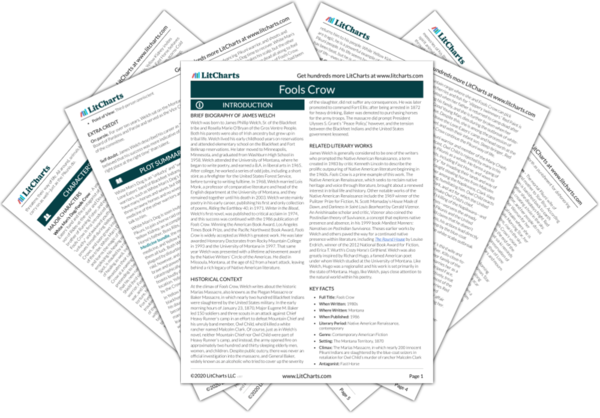The white stone, which first appears in Fools Crow’s dream with Skunk Bear, is symbolic of western expansion and the whitewashing of Pikuni culture. In Fools Crow’s dream, he finds himself at the bank of a river he has never seen before, where white water washes over white stones. The ground is also covered in white frost, and when Fools Crow asks Skunk Bear why everything is so white, Skunk Bear replies, “That’s the way it is now.” The white stones and frost in Fools Crow’s dream reflect the increasing presence of the white settlers on Pikuni land and their attempts to control and assimilate the native Blackfeet Indians.
The white stone is also symbolic of Kills-close-to-the-lake’s betrayal of her husband, Rides-at-the-door. Kills-close-to-the-lake lusts after Fools Crow, who is Rides-at-the-door’s son, and Skunk Bear punishes her as a reminder of her “wickedness.” In her own dream at the strange white river, Kills-close-to-the-lake is visited by Skunk Bear, who “ravishes her” before biting off her finger. He then throws the finger, which turns into a white stone when it hits the ground. Kills-close-to-the-lake picks the stone up and later gives it to Fools Crow, who rubs it and finds power in it. Ironically, Fools Crow associates the white stone with the battle song given to him by Skunk Bear during his dream by the river, and he sings this song to find courage during the vision quest he takes to save his people from the invading white settlers. That Fools Crow and his people must eventually leave their land in order to survive suggests that the stone, while indeed helping Fools Crow come to this conclusion in order to survive, still represents the erasure of Pikuni culture from their own land.
The White Stone Quotes in Fools Crow
“It is good to see you again, brother,” [Skunk Bear] said. “I have got myself caught again and there is no one around but you.”
“But why is it so white, Skunk Bear?” White Man’s Dog had to shield his eyes from the glare.
“That’s the way it is now. All the breathing things are gone—except for us. But hurry, brother, for I feel my strength slipping away.”










